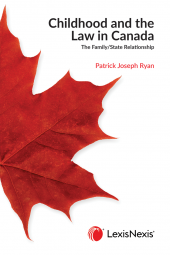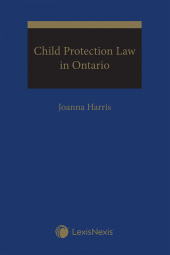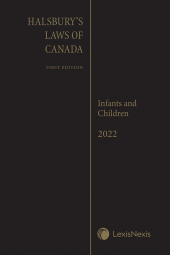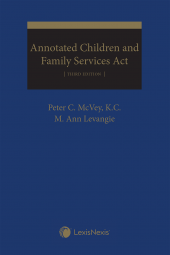Childhood and the Law in Canada – The Family/State Relationship
One Year Subscription Only Terms
Subscribers receive the product(s) listed on the Order Form and any Updates made available during the annual subscription period. Shipping and handling fees are not included in the annual price.
Subscribers are advised of the number of Updates that were made to the particular publication the prior year. The number of Updates may vary due to developments in the law and other publishing issues, but subscribers may use this as a rough estimate of future shipments. Subscribers may call Customer Support at 800-833-9844 for additional information.
Subscribers may cancel this subscription by: calling Customer Support at 800-833-9844; emailing customer.support@lexisnexis.com; or returning the invoice marked 'CANCEL'.
If subscribers cancel within 30 days after the product is ordered or received and return the product at their expense, then they will receive a full credit of the price for the annual subscription.
If subscribers cancel between 31 and 60 days after the invoice date and return the product at their expense, then they will receive a 5/6th credit of the price for the annual subscription. No credit will be given for cancellations more than 60 days after the invoice date. To receive any credit, subscriber must return all product(s) shipped during the year at their expense within the applicable cancellation period listed above.
Détails des produits
Childhood and the Law in Canada – The Family/State Relationship offers a series of six case studies in family law and the treatment of children in care, schools, and other social institutions. It advances the understanding of foundational legal concepts, current political issues and places legal disputes in historical context.
The content presented in this book helps to clarify the social and legal significance of each case, and helps the reader engage with the competing claims put forward by the parties, interveners and judges. Readers will learn what the courts held, examine their reasoning, and follow the consequences of landmark decisions for contemporary Canadian institutions and social relationships.
Topics Covered
- The doctrine of parens patriae
- The best interests of the child test
- The reproductive rights of the disabled
- The question of racial socialization in custody disputes
- The international system for returning children unlawfully separated from one parent by another
- The constitutional challenge to corporal punishment
- The development of a legal duty to report
- The history of children’s evidence in courts
- The use of the law of torts to address the mistreatment of children in care
- The role of the courts in Canada’s response to the harms caused by Indian Residential Schools
Who Should Read This Book
- Family law practitioners who need a concise practical guide to assist in their practice
- Non-specialist lawyers and government agencies (Children’s Aid, Legal Aid, Office of the Children’s Lawyer, Office of the Public Guardian) who need a one-stop reference to aid in their work
- Law libraries who need a reliable resource on children and the law for patrons
- Law schools and law students studying Canadian family law
Table des matières
Prologue: Why Study Cases?
Chapter 1: E. v. Eve, (1986) SCC: Parens Patriae, Eugenics and the Best Interests of Dependents
Chapter 2: Van de Perre v. Edwards (2001) SCC: Custody, Support, Racial Socialization and the Best Interests of the Child
Chapter 3: Ellis v. Wentzell-Ellis, (2010) ONCA: International Law, Custodial Rights and High-Conflict Families
Chapter 4: Canadian Foundation v. Canada, (2004) SCC: Corporal Punishment, Parental Rights and Children’s Equality Under the Law
Chapter 5: R. v. Kaija, (2007) ONCA: Sex Crime, Children’s Evidence and the Duty to Report
Chapter 6: Blackwater v. Plint (2005) SCC: Indian Residential Schools, Liability Law and Cultural Loss
Epilogue: What Have We Learned?
Table of Cases
 Lexis Nexis
Lexis Nexis 


